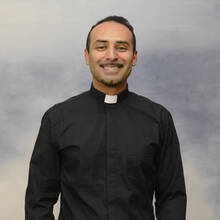There is beauty in the ugly
In this week’s readings, the divine presence is at home in areas that some might call ugly. God is close to those who struggle for a different world and one might even find a sense of beauty in this awareness.
Jesus said to the Twelve: Fear no one. (Mt 10:26)
What struggles are you facing today?
Is it the “right” struggle, as opposed to one that distracts you from the mission of the kingdom?
What areas in your life overflow in the gracious gift of Christ?
A recent incident here in Montana illustrates well that beauty can be found within tragedy and the ugly. Mika Westwolf, a tribal member of the Blackfeet Nation, was the recent victim of a tragic death along Hwy 93 in western Montana. Her case is presently under investigation as intentional vehicular manslaughter. Mika’s tragedy is a common one on Native American reservations. By the lack of a thorough investigation, justice is often denied in cases similar to Mika’s. This lack of due process only adds to the plight of the poor.
In one of her journal entries, Mika wrote, “Heaven on earth is what we seek, but we forget that there is beauty in the ugly. Oh, how life would be if there were no ugly. No struggle, just everything we need was guaranteed. Ya know the type of certainty that only a God can see.”
The fact that God is close to the ugly is a theme that runs throughout the whole of Scripture. God is repeatedly present and attentive to the broken and downtrodden. In this Sunday’s first reading, for example, the prophet Jeremiah cries out, “I hear the whisperings of many: Terror on every side!” (Jer 20:10). Optimism appears futile for Jeremiah, but the prophet ends on a hopeful note, “Sing to the Lord, for he has rescued the life of the poor from the power of the wicked” (Jer 20:13).
If there were no struggle there would be no kingdom.
Divine beauty, as described in today’s psalm, is at least in part a product of God’s care for the plight of the poor. “See you lowly ones,” writes the psalmist, “and be glad; may your hearts revive! For the Lord hears the poor” (Ps 69:33-34). Today’s psalm recognizes that God’s chosen ones are often in a difficult type of persecution, “His own who are in bonds he spurns not” (Ps 69:34). In today’s second reading, the sin of Adam is described as a kind of ugly transgression that bleeds into all of humanity. Paul, fortunately, finds a hopeful resolution in this pernicious reality. One might even say that for Paul there is beauty in the mystery of salvation in response to sin found in the abundance of grace for all through the one Christ. “How much more, “writes Paul, “did the grace of God and the gracious gift of the one man Jesus Christ overflow for the many” (Rom 5:15).
In today’s Gospel, Jesus speaks directly to his disciples about the struggle inherent to their new mission to proclaim the coming of the kingdom. This proclamation will be met with persecution. “Fear no one,” he says to the Twelve, “And do not be afraid of those who kill the body but cannot kill the soul” (Mt 10:26-28). Earlier in this Gospel, Matthew described the first beatitude as, “Blessed are the poor in spirit, for theirs is the kingdom of heaven” (Mt 5:3). This is tied, however, to the last beatitude, “Blessed are those who are persecuted for righteousness’ sake, for theirs is the kingdom of heaven” (Mt 5:10). The theme within the Gospel of Matthew is that struggle is inherent to the coming of the kingdom.
If there were no struggle there would be no kingdom. Mika was right when she wrote, “there is beauty in the ugly.” There is beauty, too, in the fearlessness to stand with the lowly as a tenet of one’s faith. “Everyone who acknowledges me before others,” Jesus reminds the Twelve, “I will acknowledge before my heavenly Father.” May we also acknowledge the struggles that the poorest in society often carry alone, may we proclaim a message that inherently belongs to them for “theirs is the kingdom.”








